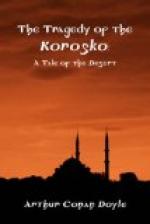an equally desolate wilderness is bounded only by
the distant Red Sea. Between these two huge and
barren expanses Nubia writhes like a green sandworm
along the course of the river. Here and there
it disappears altogether, and the Nile runs between
black and sun-cracked hills, with the orange drift-sand
lying like glaciers in their valleys. Everywhere
one sees traces of vanished races and submerged civilisations.
Grotesque graves dot the hills or stand up against
the sky-line: pyramidal graves, tumulus graves,
rock graves—everywhere, graves. And,
occasionally, as the boat rounds a rocky point, one
sees a deserted city up above—houses, walls,
battlements, with the sun shining through the empty
window squares. Sometimes you learn that it has
been Roman, sometimes Egyptian, sometimes all record
of its name or origin has been absolutely lost.
You ask yourself in amazement why any race should
build in so uncouth a solitude, and you find it difficult
to accept the theory that this has only been of value
as a guard-house to the richer country down below,
and that these frequent cities have been so many fortresses
to hold off the wild and predatory men of the south.
But whatever be their explanation, be it a fierce neighbour,
or be it a climatic change, there they stand, these
grim and silent cities, and up on the hills you can
see the graves of their people, like the port-holes
of a man-of-war. It is through this weird, dead
country that the tourists smoke and gossip and flirt
as they pass up to the Egyptian frontier.
The passengers of the Korosko formed a merry
party, for most of them had travelled up together
from Cairo to Assouan, and even Anglo-Saxon ice thaws
rapidly upon the Nile. They were fortunate in
being without the single disagreeable person who,
in these small boats, is sufficient to mar the enjoyment
of the whole party. On a vessel which is little
more than a large steam launch, the bore, the cynic,
or the grumbler holds the company at his mercy.
But the Korosko was free from anything of
the kind. Colonel Cochrane Cochrane was one of
those officers whom the British Government, acting
upon a large system of averages, declares at a certain
age to be incapable of further service, and who demonstrate
the worth of such a system by spending their declining
years in exploring Morocco, or shooting lions in Somaliland.
He was a dark, straight, aquiline man, with a courteously
deferential manner, but a steady, questioning eye;
very neat in his dress and precise in his habits,
a gentleman to the tips of his trim finger-nails.
In his Anglo-Saxon dislike to effusiveness he had cultivated
a self-contained manner which was apt at first acquaintance
to be repellent, and he seemed to those who really
knew him to be at some pains to conceal the kind heart
and human emotions which influenced his actions.
It was respect rather than affection which he inspired
among his fellow-travellers, for they felt, like all




